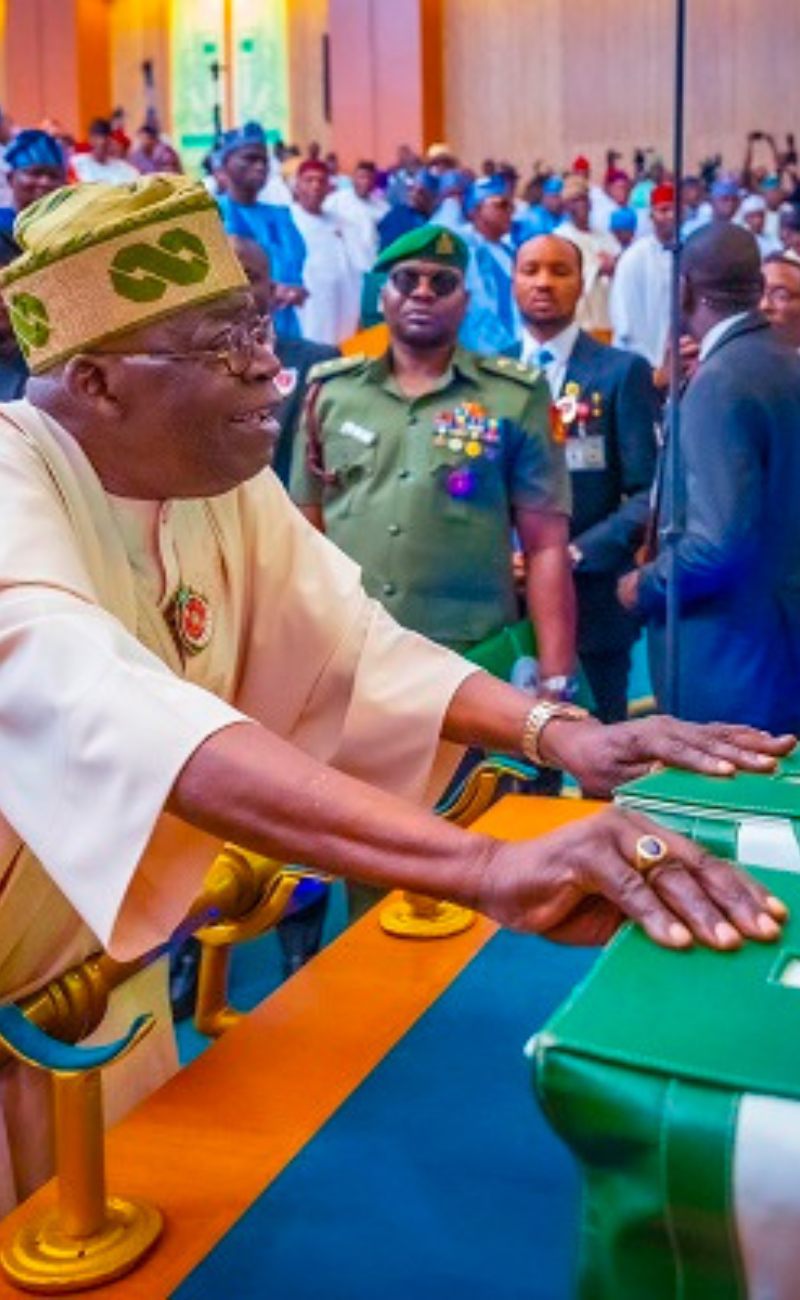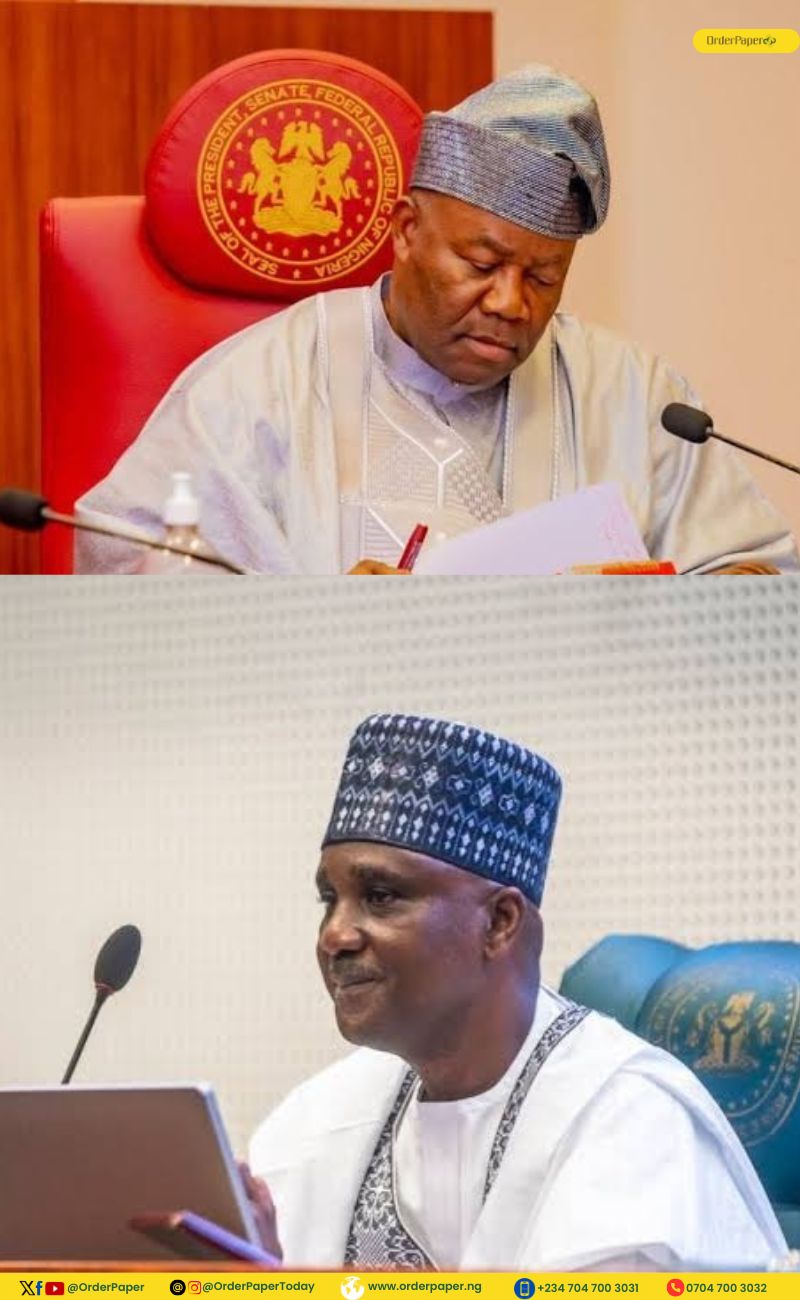Like the House of Representatives, female representation in the Senate is almost negligible. Nigerians elected just 43 women out of 763 Senators in the last 25 years (1999-2024) of the federal legislature. This represents a mere 5.6% of women in a male-dominated parliament.
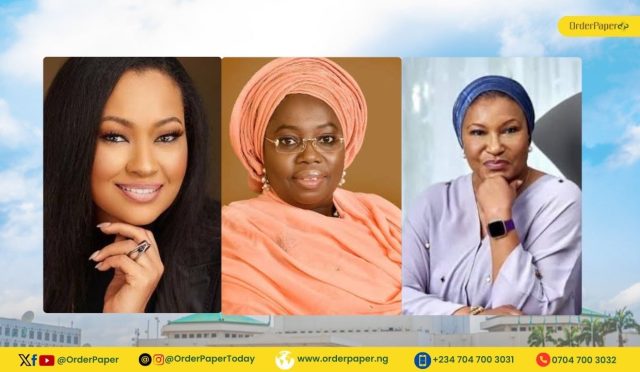
Female representation in the decision-making cadre of leadership in Nigeria is still far below expectation. As of today, very few women participate in politics even though the country has a population of over 200 million people.
A disproportionate political representation…
A report in 2023 stated that women elected and appointed to political positions made up only 6.7 per cent of all political leadership positions in Nigeria. This is much less than the global average of 22.5 per cent, the regional average for Africa of 23.4 per cent and the West African average of 15 per cent respectively according to the report. This shows that Nigeria has not attained 30 per cent affirmative action as prescribed by the Beijing Platform of Action.
According to the National Bureau of Statistics (NBS), women in Nigeria constitute 49.95 per cent of the overall population of 2022. Yet they are traditionally expected to play the roles of mothers, wives, daughters, and sisters. These cultural positions sometimes involve caring for children at home or doing menial jobs like selling crafts. This conventional role is related to why many Nigerian males discountenance women and oppose their participation in politics.
In considering the female parliamentary representation in Nigeria since the return to democracy in 1999, data available indicates that women are still poorly represented.
READ ALSO: NATIONAL ASSEMBLY @ 25: Women grossly underrepresented in House of Reps
25 years of women in the Senate
In continuation of OrderPaper’s specially designed signature and incisive ‘National Assembly at 25’ series on the 4th Republic of Nigeria’s democracy, this article collates all the female lawmakers in the Senate from 1999 to date, indicating their states of origin and political party affiliation. The infographics below present key facts that tell the story succinctly:

Data available shows that only 43 women, (a mere 5.6%) have been elected into the Senate out of 763 senators that represented different senatorial districts in the last 25 years (1999-2024).
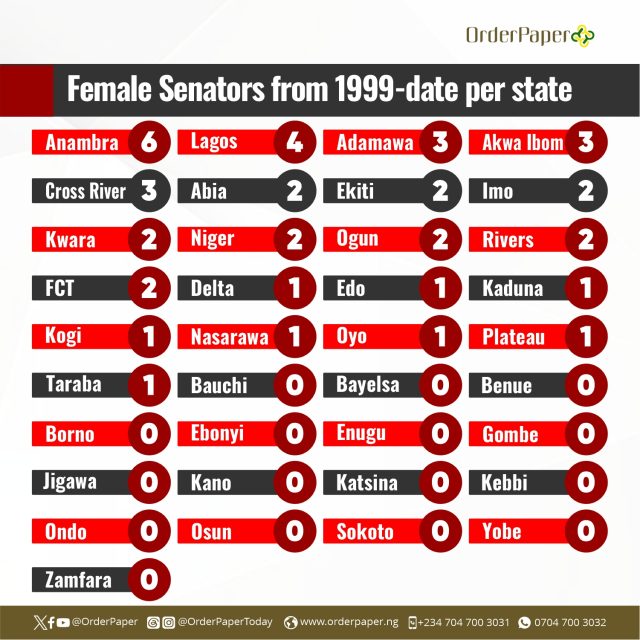
Female senators per state representation: With six senators, Anambra leads with the highest number of women who have been elected into the Senate in the last 25 years. It is followed by Lagos state with a total number of four females in the last 25 years. Instructively, 16 of the 36 states have failed to elect a female senator in the last 25 years.
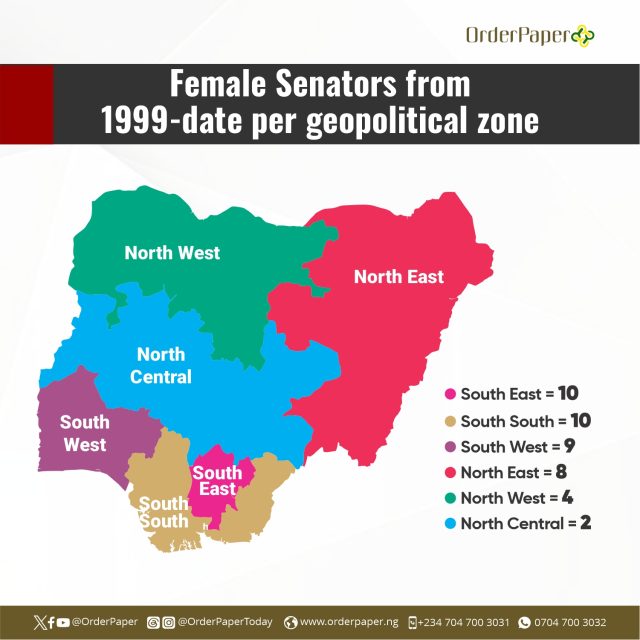
Female Senators per geopolitical zone in the last 25 years: There are six geo-political zones in Nigeria. The South-east and the South-south zones have each elected 10 female senators respectively. The North-central zone has the lowest figure with two female Senators in 25 years. 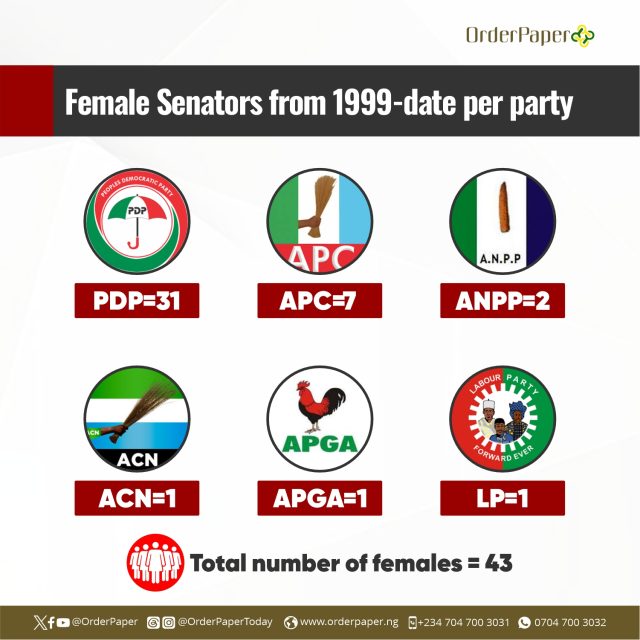
Female Senators from 1999 till date per political party: The Peoples Democratic Party (PDP) has had more females elected into the Senate than the other political parties combined, with 31 senators of the 43 female senators elected. This may be because the PDP has been the ruling party for the most number of years in the period under review.
Female faces and the proportional representation (4th to 10th assemblies)
The pair of infographics below show the faces of females who have been elected into the Senate since 1999 till date (4th to 10th assemblies) and how each set stood against the proportion of their male counterparts:


Female senators 5th Assembly (2003 – 2007)
All four female lawmakers were elected on the platform of the PDP. Meanwhile, the South-south, South-west, South-east and North-central zones elected one female senator each.
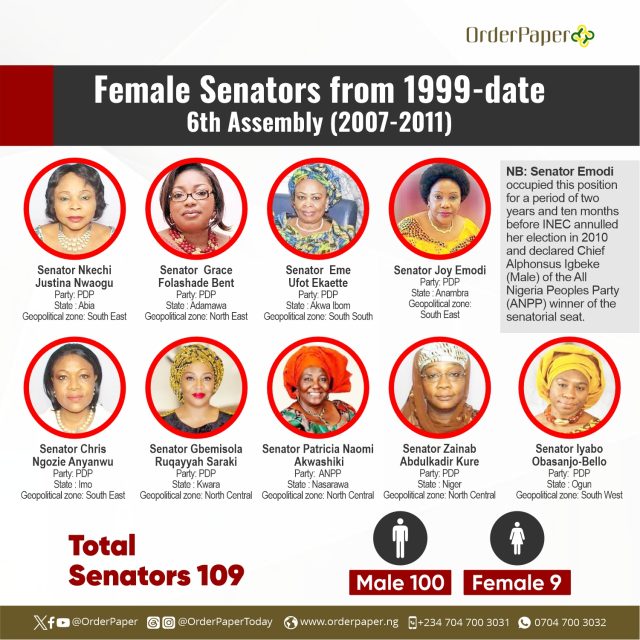
Female Senators 6th Assembly (2007-2011)
Out of the nine female Senators in this assembly, eight were elected on the platform of the PDP while the ANPP had one representation. The South-east and North-central had three each. The South-west, North-east and South-south had one representative each. It is worthy of note that Senator Joy Emodi of this class of female senators occupied this position for two years and ten months before INEC annulled her election in 2010 and declared Chief Alphonsus Igbeke (Male) of the All Nigeria Peoples Party (ANPP) winner of the senatorial seat.
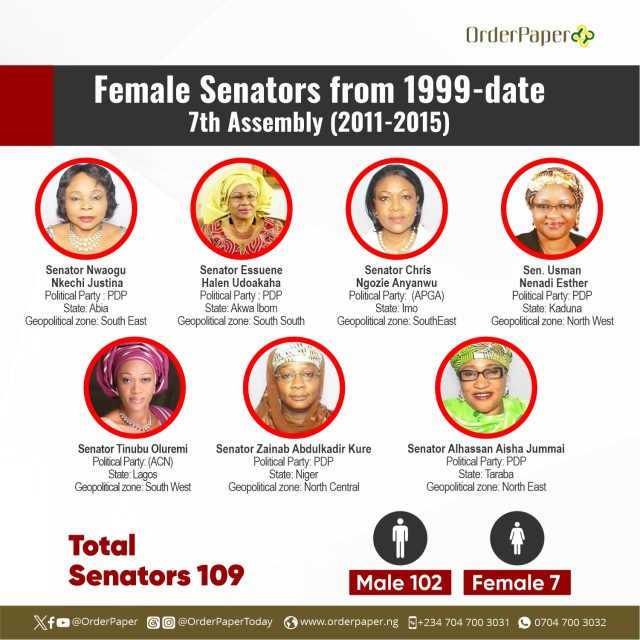
Female Senators 7th Assembly (2011-2015)
The PDP elected five out of the seven female Senators while APGA and ACN had one female senator respectively. The North-east and South-east had two representations each while the South-west, North-west and North-central had one each.
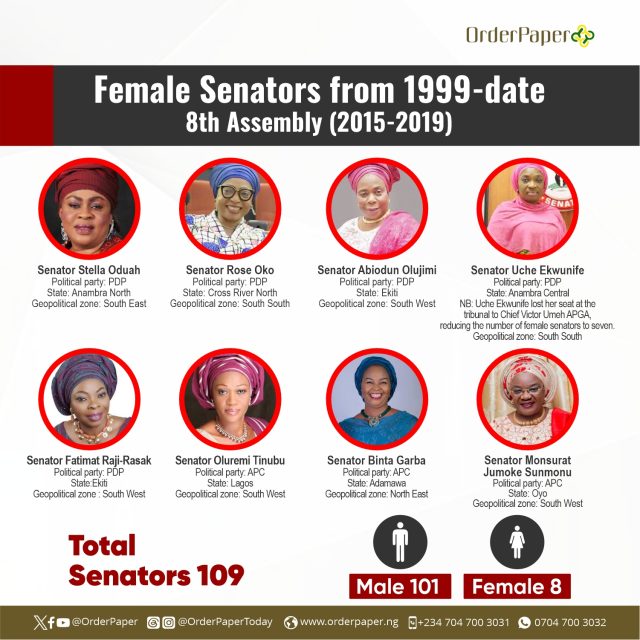
Female Senators 8th Assembly (2015-2019)
The female senators in the Eighth Assembly could be referred to as brave considering the challenges they overcame to be elected into the red chamber. Unfortunately, Uche Ekwunife lost her seat at the tribunal to Victor Umeh of APGA, reducing the number of female senators to seven. She was a very vibrant and outspoken representative.
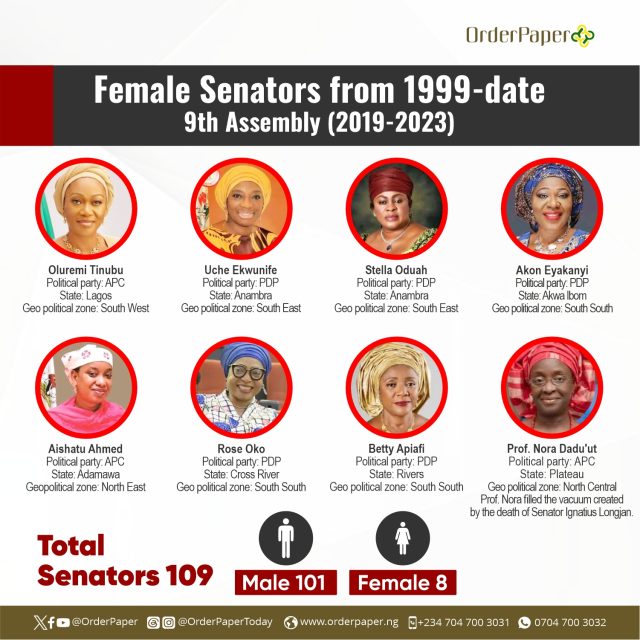
Female Senators 9th Assembly (2019-2023)
The ninth assembly had eight female senators. Three from the South-south, two from the South-east while South-west, North-west and North-central had one each. Prof. Nora Dadu’ut of Plateau State, became the first female Senator from the State as she filled the vacuum created by the death of Senator Ignatius Longjan. Sadly Rose Oko (Cross River) died in March 2020 while still serving her constituents in the Senate.
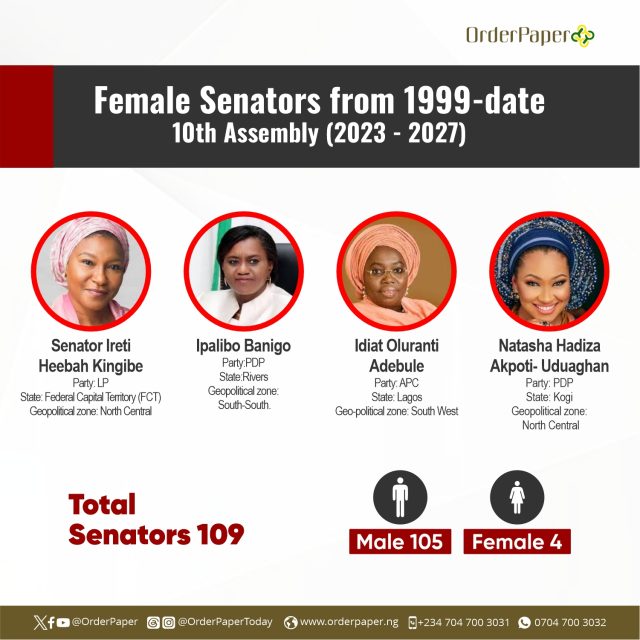
Female Senators 10th Assembly (2023-2027)
The 10th assembly has four female senators, one each from the North-central, South-south, South-west and the Federal Capital Territory (FCT), Abuja. Interestingly, they are all first-term senators.

